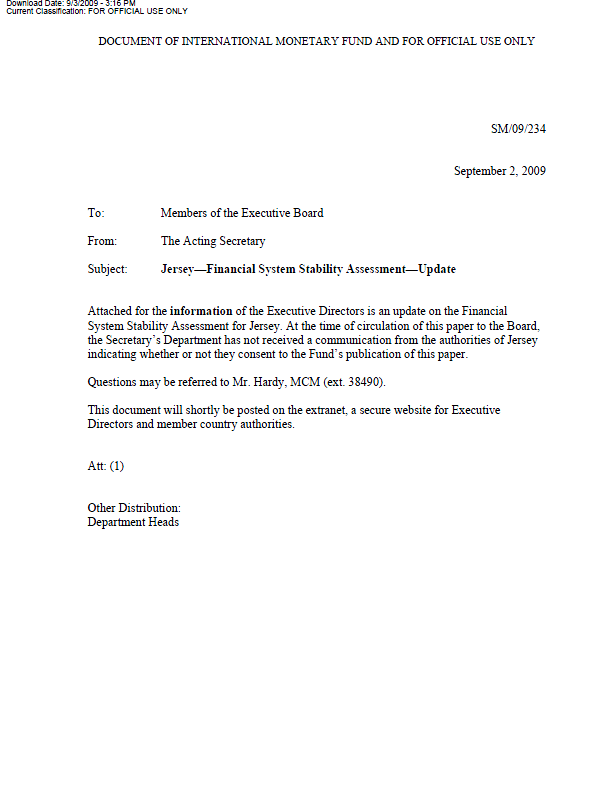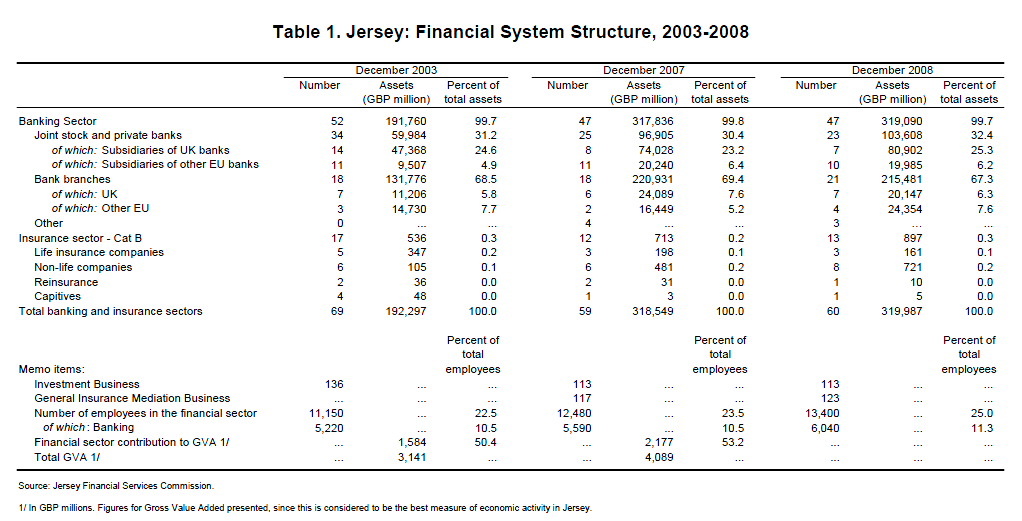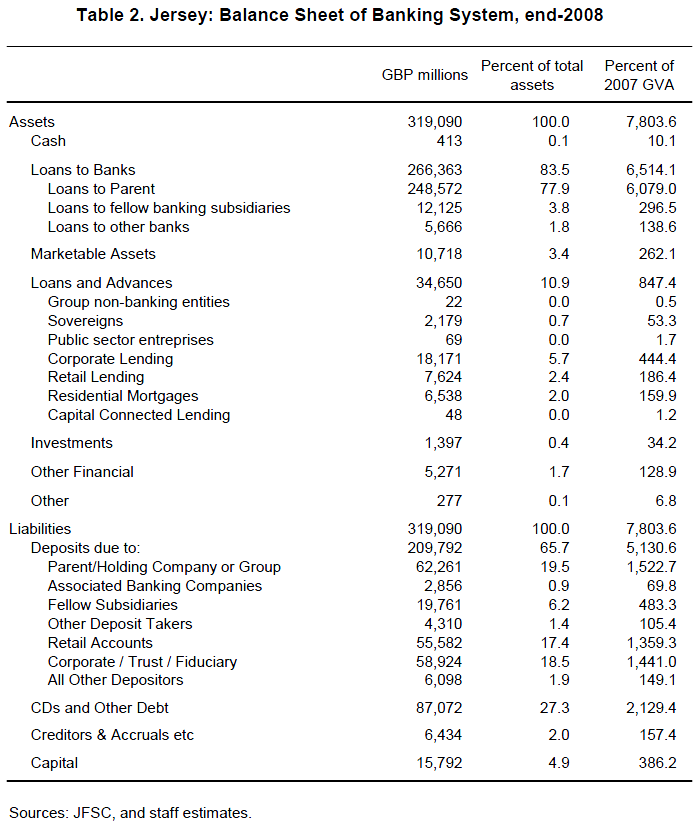 SM/09/234
SM/09/234
- 80 pages
- For Official Use Only
- September 2, 2009
This report presents the conclusions of the Financial Sector Assessment Program (FSAP) Update mission that
visited Jersey, November 11-21, 2008. The mission comprised Daniel Hardy (mission chief), Andrea Maechler,
Ian Tower (all MCM/IMF), Jürgen Dreymann (BaFin, banking supervision expert), and Keith Bell (banking
supervision expert). The mission worked closely with the overlapping LEG mission (led by Terence Donovan)
that conducted an assessment of the anti-money laundering and combating the financing of terrorism
(AML/CFT) provisions. The mission received excellent cooperation and support from the authorities.The main findings of the FSAP update are:
- Financial sector regulation and supervision are of a high standard, and processes and resourcing have been significantly enhanced since a 2003 assessment under the Offshore Financial Center (OFC) program. The Jersey Financial Services Commission (JFSC) operates with considerable independence as well as accountability, and has broadly adequate resources.
- The financial crisis has highlighted the vulnerability of Jersey’s banks to events in major financial centers. While Jersey supervisors cannot feasibly analyze in depth the soundness of the financial groups to which their Jersey operations provide extensive funding, it should be able to detect and react to intensified risks stemming from parent institutions.
- Jersey has experienced some effects from the global crisis, but financial soundness indicators (FSIs) for institutions licensed on the island have been satisfactory, and stress tests confirm that the system is resilient to a range of shocks. However, there is high concentration risk and spill-over risk from parent banks.
- The authorities are making contingency plans, a key element of which will be cooperation with home supervisors. Experience elsewhere suggests the usefulness of a dedicated bank insolvency regime.
- Possible introduction of a bank depositor compensation scheme would require careful study. In any case, all depositors must receive clear information on who is responsible for safeguarding their claims and the scheme’s coverage, if any.
The main authors of this report are Daniel Hardy and Ian Tower with input from other members of the FSAP Update team.
…
…
II. REGULATORY AND SUPERVISORY SYSTEM
6. The 2003 OFC assessment noted that Jersey’s financial regulatory and
supervisory system complies well with international standards. The JFSC was assessed
to have made progress in international standards for banking, insurance, securities, and
AML/CFT. The framework for trust and company service provider regulation was largely
consistent with international best practice. In addition to several specific recommendations in
relation to individual principles, the assessment emphasized as areas for improvement:(i) Enhancing the independence of the JFSC.
(ii) Increasing its resources and improving its processes, especially with respect to on-site
supervision.(iii) Formalizing supervisory guidance for credit policies, loan evaluation, and loan-loss
provisioning.(iv) Introducing prudential requirements for market risk.
7. Since 2003, the authorities have made considerable efforts to enhance regulation
and supervision, in particular through more on-site supervision (see below, Appendix
II, and the Annex with ROSCs). The JFSC has become more risk-oriented, for example in
its use of a risk model for assessing regulated firms, and conducts extensive on- and off-site
supervision across the financial sector. Legislation has been updated and initial steps taken
toward the long-term objective of a single legislative framework applying to all sectors.
Regulatory principles have been elucidated in new codes of practice and regulations.…
B. Banking Sector
15. The BCP assessment undertaken by the mission confirms the high standard of
prudential regulation and supervision described in the 2003 assessment, and issues
identified at that time have largely been addressed. Most importantly, the JFSC now
conducts a large program of on-site supervision, supported by off-site analysis. The JFSC
follows up on visits with detailed recommendations. In addition, a framework of minimum
prudential standards is provided by the Banking Business (Jersey) Law 1991 and other
legislation.16. Pillars 1 and 2 of the Basel II capital requirements were introduced in 2008.
Most banks adopt the standardized approaches. The JFSC has set a minimum risk-weighted
capital adequacy requirement (CAR) of 10 percent, and in some cases banks have additional
capital requirements under Pillar 2. Moreover, if a bank’s capital approaches the minimum,
consultations on remedial action are triggered. The JFSC has reviewed banks’ Internal
Capital Adequacy Assessment Processes (ICAAP). Since banks’ internal models are complex
and evolving rapidly, the JFSC will need to take care to ensure that it maintains up-to-date
expertise in this area.17. The authorities complement regulation and supervision by an express policy of
limiting entry to banks with strong parents. Only groups that are among the global top 500
in terms of Tier I capital and meet certain other requirements are permitted to open on the
island. These banks are presumed able and willing to provide their Jersey affiliates with
support in case of local difficulties, and are likely to be viewed as too big to fail in their home
jurisdictions. Furthermore, these banks tend to have centralized risk management and internal
controls procedures, which are imposed on their Jersey affiliates, as well as central treasury,
trading and risk modeling functions, so Jersey operations are relatively straightforward.


